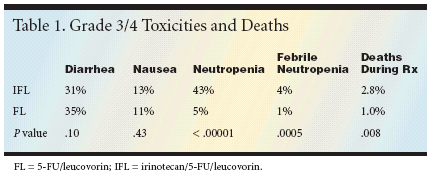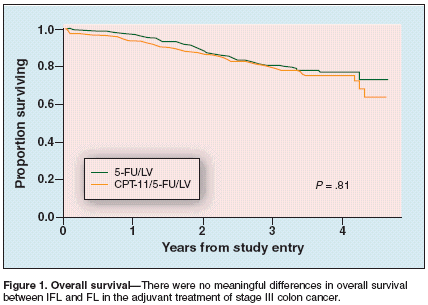IFL Usefulness Does Not Extend to Adjuvant Treatment of Stage III Colon Cancer
The 30 reports in this special supplement to Oncology News International represent highlights of ongoing major clinical trials and new research presented at ASCO 2004 regarding state-of-the-art chemotherapeutic management of gastrointestinal and other cancers. Important developments in capecitabine as adjuvant therapy, novel targeted agents, and new combinations are discussed.
NEW YORK - Weekly bolus IFL(irinotecan [CPT-11,Camptosar]/fluorouracil[5-FU]/leucovorin [folinicacid]) "should not be used" in themanagement of stage III colon cancer,according to Leonard Saltz, MD, anassociate attending physician atMemorial-Sloan Kettering CancerCenter.Compared with the Roswell Parkschedule of bolus 5-FU/leucovorin(FL), weekly bolus IFL had no additionalclinical benefit, and it was associatedwith greater toxicity and moredeaths on treatment, Dr. Saltz report-ed (abstract 3500) (Table 1).

"These are not preliminary findings,"Dr. Saltz said. "The futilityboundaries have been crossed and thiswill not be a positive study."Route of AdministrationMay Play Role
Positive results using IFL to treatmetastatic colorectal cancer have ledinvestigators to hypothesize that IFLalso may be beneficial in the adjuvantsetting. It is unclear why such a benefitwas not shown, although there is somespeculation that the route of 5-FUadministration (bolus vs infusional)may play a role."Why didn't it work? Was it thedrug or the regimen? I don't think weknow the answer yet," Dr. Saltz said."There is certainly some evidence thatadding other efficacious agents, suchas oxaliplatin [Eloxatin], to 5-FU/leu-covorin can lead to favorable outcomesin stage III colorectal cancer."

Dr. Saltz reported the results of theCancer and Leukemia Group B(CALGB) study C89803, an intergrouptrial designed to evaluate the usefulnessof irinotecan when added to bolusFL after curative resection for patientswith stage III colon cancer (TanyN1-2M0)who have had no prior chemotherapy.Patients were randomized to receive:
- the Roswell Park FL schedule ofleucovorin 500 mg/m2 IV over 2 hours,plus 5-FU 500 mg/m2 1 hour after startof leucovorin, 6 weeks on, 2 weeks offfor four cycles; or
- an IFL schedule of irinotecan125 mg/m2 over 90 minutes followedby leucovorin 20 mg/m2 IV bolus, then5-FU 500 mg/m2 IV bolus 4 weeks on,2 weeks off for five cycles.
'No Meaningful Differences'
Approximately 55% of patientswere male and about 25% were age 70years or older. Zubrod performancestatus was 0 in more than 70% ofpatients; the rest had a performancestatus of 1. Seventy-five percent hadT3 disease and the majority of patients(61%) had N1 disease.With a median follow-up of 3 years,there were "no meaningful differences"in overall survival between IFL andFL (P = .81), Dr. Saltz reported. Theinvestigational arm actually tracked"slightly below" the control arm,although not to a significant degree(see Figure 1).Similarly, failure-free survival anddisease-free survival data provided noindication of improving when irinotecanwas added (
P
values of .89 and.80, respectively).There was an excess of potentiallytreatment-related deaths accruing tothe IFL arm, 2.8% vs 1% for FL (
P
=.008). While diarrhea and nausea rateswere similar for IFL and FL, rates ofneutropenia and febrile neutropeniawere higher for IFL; the rate of febrileneutropenia was 4% for IFL vs 1% forFL (
P
= .0005, see Table 1).These results were somewhat unexpected.Irinotecan has proven ben-efit in second-line treatment of metastaticcolorectal cancer, and as firstlinetherapy, irinotecan improves survivalwhen added to bolus or infusionalFL."It seemed like a reasonable andalmost slam-dunk idea," Dr. Saltz said,"that if we put irinotecan into theadjuvant setting, we would improveoutcomes for our patients."There is certainly evidence that otheractive agents, namely oxaliplatin,can lead to favorable outcomes whenadded to standard therapy for stage IIIcolorectal cancer. Last year at ASCO,De Gramont et al showed that oxaliplatinplus infusional FL (FOLFOX-4)significantly improved 3-year diseasefreesurvival rates vs infusional FLalone."The question is whether this wouldbe seen with irinotecan and infusionalFL," Dr. Saltz.
Other Studies Underway
There are studies underway thatwill address the question of irinotecanplus infusional FL in the adjuvant setting.One is PETACC III, a large,randomized trial comparing a 5-FU/folinic acid/irinotecan (FOLFIRI) regimenwith infusional FL in 800 stage IIand 2,330 stage III patients. The studyclosed to accrual in 2002 and resultsare expected later this year.The phase III randomized Accord02/FFCD9802 trial is also evaluatingthe FOLFIRI regimen vs infusionalFL. That trial has enrolled 400patients. Interim safety results weredescribed at ASCO 2003 (abstract1183) and more results are anticipatedin late 2004."We need to keep an open mind onthe question of whether or not irinotecanwith infusional 5-FU will be efficaciousor not in stage III patients,"Dr. Saltz said. "Right now, we simplydon't have data."